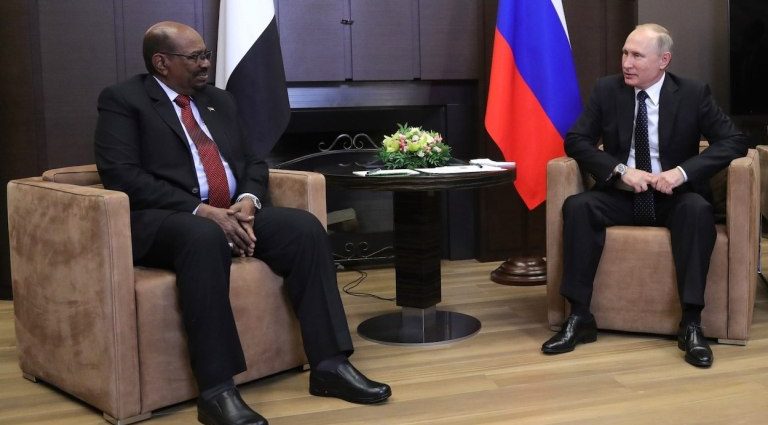
The war in Ukraine has laid bare Russia’s military weaknesses, and a key area of concern for the Kremlin is the health of its navy. With the Russian Black Sea Fleet an easy target for Ukrainian anti-ship missiles, Moscow is eyeing alternatives, including a long-planned naval base in Sudan.
Whether Russia has the money, or the means, to get what it wants in the Red Sea is another matter.
The Kremlin’s idea of strengthening its influence in Northeast Africa dates to November 2017, when the president of Sudan at that time, Omar al-Bashir, discussed the possibility of a Russian military base in his country with Russian President Vladimir Putin and Defense Minister Sergey Shoigu.
Three years later, Moscow and Khartoum signed a draft agreement, good for 25 years. While the deal was approved by the ruling military this month, it hasn’t been ratified by Sudan’s yet-to-be-formed legislative body.
But that hasn’t kept Moscow from moving full steam ahead. Increasingly isolated in Europe, Russia is keen to establish a presence in the Red Sea to project power and expand its trade potential.
For instance, Russian Foreign Minister Sergey Lavrov has visited the region twice this year to advocate for the base. In his view, a deal to establish Russia’s naval presence on the Sudanese coast is moving in the right direction.
In reality, though, Khartoum looks to be strongarming Moscow by asking for economic aid in exchange for access to its maritime waters. Sudan has also amended the original agreement; it now only allows Russian naval vessels to stay for five years, with the “possibility” of extending the total lease to 25.
Sudan has plenty of reasons to stall – not least of which is its desire to improve relations with the West, as well as with Israel.
Additionally, Sudan’s leaders may want to use Washington’s opposition to the base as leverage, aware that for Russia, meeting Sudan’s price tag would require vast sums of political and economic capital that Moscow doesn’t possess. Western powers, led by the United States, could easily offer Sudan more money in exchange for giving Russia the cold shoulder.
Of course, as the only military superpower in the region, the US can disrupt Russia’s port project. Washington has warned Sudan to end its ties to the Wagner Group, a paramilitary organization linked to the Kremlin. With naval bases in Djibouti and Diego Garcia in the Indian Ocean, not to mention the Fifth Fleet in Bahrain, the US maintains a military shadow over any Russian naval expansion.
Even without direct Western intervention, Russia’s Red Sea ambitions face several hurdles.
For starters, countries could follow Bangladesh’s lead and bar entry of Russian ships to their maritime waters.
It’s possible that Russian vessels en route to Sudan might be blocked from passing through the Suez Canal – similar to how Turkey closed the Bosporus and Dardanelles straits to Russian naval vessels in March 2022 – which is controlled by Egypt. Cairo, one of the biggest importers of Russian grain, strongly opposes the Kremlin’s plans to establish a military presence in Sudan.
Second, while Moscow appears willing to provide weapons and military equipment to the Sudanese Armed Forces in exchange for access to the strategically important region, it’s not clear that it could deliver. Russia’s military faces its own weapons shortages in Ukraine, and has been forced to import drones, ballistic missiles and ammunition from Iran and North Korea.
A third obstacle for Russian strategic planners is Sudan’s political instability. With a history of coups – there have been 17 coup attempts, six of them successful, since 1950 – there’s no guarantee that even if parliament eventually ratified the deal that it would survive the next political drama in the country.
For now, the Kremlin’s goals in Northeast Africa seem like a long shot. Bogged down in Ukraine and short on military bargaining chips, Moscow’s ability to buy naval dominance is greatly diminished.
What’s more, if the Russian military couldn’t seize the strategically important Ukrainian ports of Odessa and Mykolaiv in the Black Sea – not far from Sevastopol, home to Moscow’s Black Sea Fleet in annexed Crimea – the chances for Russian control of the Red Sea are, for now, fantasy.
Then again, if Russia were ever able to sail into Sudan, it could rewrite the balance of power in one of the world’s most strategic waterways.
This article was provided by Syndication Bureau, which holds copyright.
Follow Nikola Mikovic on Twitter @nikola_mikovic.

